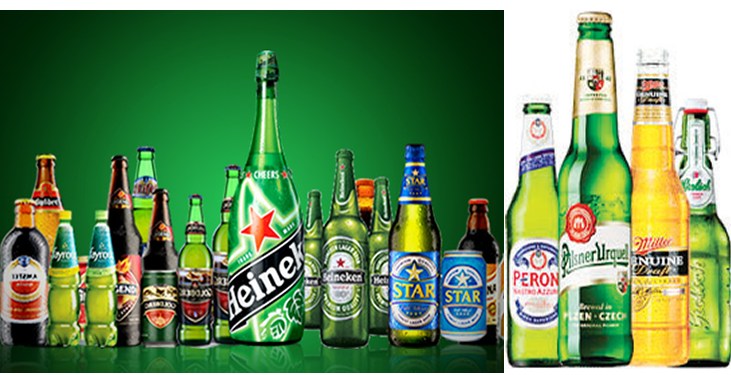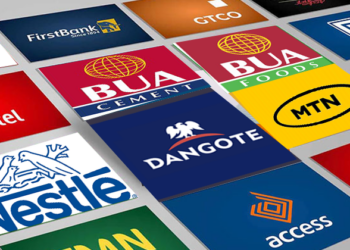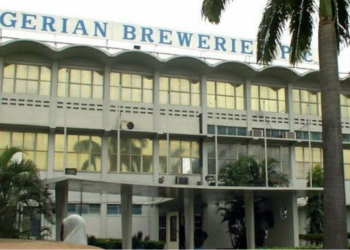In the 2023 fiscal year, Nigerian Breweries Plc (NB), a subsidiary of Heineken NV, encountered its most challenging period, primarily due to significant losses on foreign exchange transactions and elevated interest expenses.
In its recently disclosed 2023 audited financial statements, the company announced a record pre-tax loss of N146 billion.
An analysis of the financial statements shows that the loss was primarily attributed to a net loss of N153.3 billion from foreign exchange transactions and N35.1 billion in interest expenses related to loans and borrowings.
Furthermore, although the Company was able to grow its revenue by 9% compared to the previous year, aided by a positive price mix, it still trailed its 5-year revenue compound annual growth rate of 13.7%.
The company announced on August 1st, 2023, a price increase on some of its SKU products, implemented on August 1st, 2023.
This year, just 4 days before the release of its audited results on February 16, 2024, the company reportedly announced the review of the prices of some of its SKUs with effect from February 19, 2024.
The company attributes its decision to review prices as a strategic response to the challenges posed by economic headwinds, particularly the soaring production costs driven by the 28.92% inflation rate recorded in December 2023 and the depreciation of the Naira to N1,499.07 against the dollar.
Price adjustments can indeed serve as a strategy to counteract rising costs. However, there is a delicate balance to strike between adjusting prices and maintaining consumer demand. If prices exceed affordability thresholds, consumer demand may decrease, potentially leading to reduced sales volumes and revenue.
In this context, high inflation rates, removal of fuel subsidies, currency devaluation, and broader economic difficulties have significantly impacted consumer purchasing power. Consumers may become more price-sensitive and conservative in their spending habits, making it challenging to rely solely on price adjustments to increase revenue and improve bottom-line performance.
Therefore, while price adjustments can be a part of the solution to address cost pressures, Nigerian Breweries must also consider other strategies to enhance profitability.
Despite implementing a price adjustment in 2023 that led to a 9% growth in revenue, the gross profit margin experienced a significant decline of 8.5% to 35.46%, marking its lowest point over the past three years. Similarly, the operating profit margin showed a lower rate compared to the previous five years, standing at 7.33%.
It is noteworthy that the company, in its earnings release report, acknowledged that the operating profit fell by 15% due to higher input costs and one-off reorganisation costs despite strong and aggressive cost savings and other efficiency measures.
However, the declining profit margins raise concerns about the efficiency of Nigerian Breweries’ operations and the ability of its operating profits to cover its rising interest expense as reflected in the decrease in the interest coverage ratio from 6.21 in 2022 to 1.22 in 2023.
A ratio of 1.22 suggests that the company’s operating profits only cover its interest expenses slightly more than once, indicating higher financial risk and limited flexibility to meet interest obligations, especially if operating profits decline further or if interest expenses increase.
Moreover, the company’s loan portfolio has reached a five-year peak of N341.6 billion, signifying approximately 179.43% year-on-year growth, with bank loans accounting for 74.26% of the total loan portfolio.
With interest rates currently at elevated levels and expected to increase further to combat inflation, the company’s substantial reliance on bank loans, as evidenced by the significant growth in its loan portfolio, may pose considerable financial challenges. Rising interest rates will likely lead to higher borrowing costs, increasing the company’s interest expense burden and potentially impacting its profitability.
Following the substantial loss after tax in 2023, the company’s compound annual growth rate (CAGR) stands at -246%. This suggests that, on average, the company’s profit after tax has declined by 246% per year.
Moreover, the loss has resulted in negative retained earnings and has significantly diminished the shareholders’ fund to a record low of N62.384 billion from N167.750 billion in 2019. This development has elevated both the debt-to-equity ratio and the equity multiplier to unprecedented levels of 539.8% and 12.58, respectively.
The company’s liquidity ratio, already at a low of 0.39, may deteriorate further under these circumstances.
Overall, the company should not solely depend on product price adjustments or incremental operational efficiency improvements and cost optimization measures.
Instead, it should consider a strategic shift in production strategies towards effectively utilizing locally produced and sourced raw materials and other input materials, both in the short term and through long-term backward integration.
Leveraging its extensive 77 years of experience in Nigeria, this approach is expected to enhance the company’s resilience, reduce supply chain vulnerabilities, worsened by the Naira devaluation.
The company should also consider equity financing to alleviate the burden of debt. Given that the shareholders’ fund is already at a low level, any additional loss, such as the one recorded in the 2023 fiscal year, will push the shareholders’ fund into negative territory.
The decline in shareholders’ value undermines investor confidence, as Nigerian Breweries’ shares are underperforming compared to other investments in the market.
In 2022, the share price declined by 18%. In 2023, it experienced an additional decline of 12.20%. Although it has seen a year-to-date gain of 5.56% this year, it still trails the broader market, which has returned 41.39% year-to-date as of the close of trading on Friday, February 16, 2024.






















